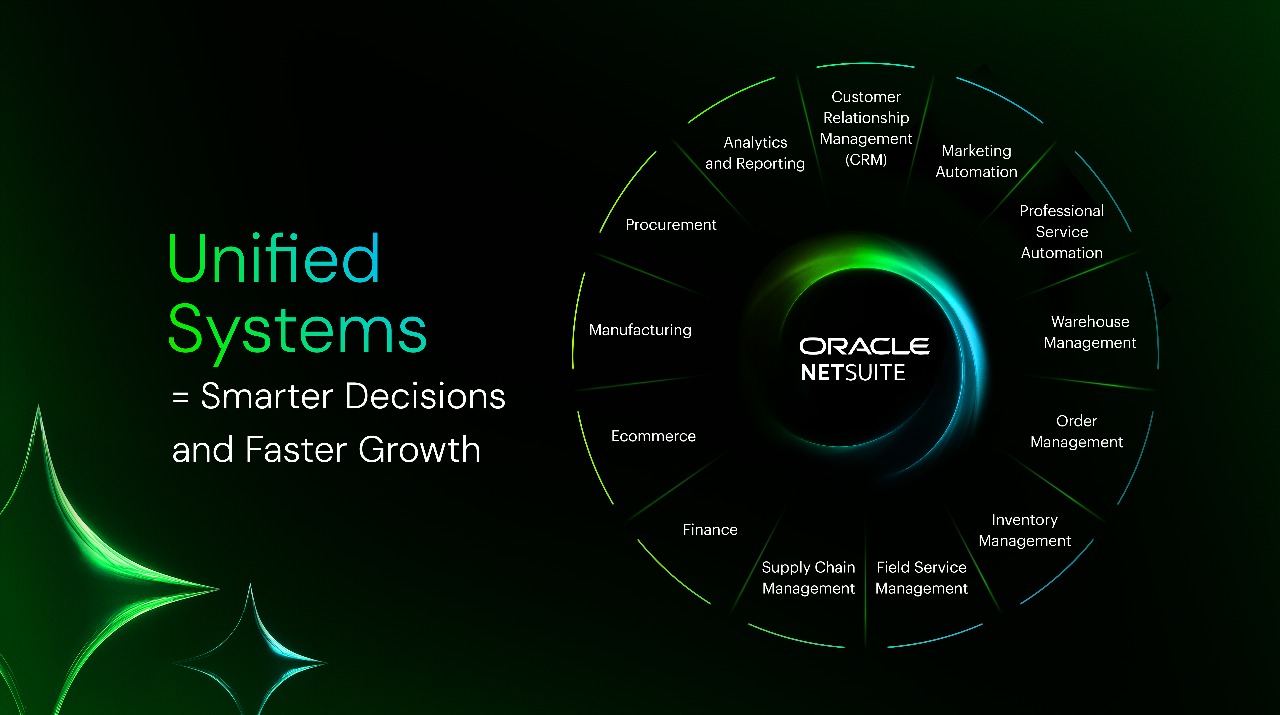NetSuite vs Traditional ERP Systems: Which is Right for You?

Enterprise Resource Planning(ERP) software is the backbone of how companies run their operations. From managing Finance and HR to keep the supply chains moving and customers happy, the right ERP can make day-to-day work easier and give leaders the insight they need to grow with confidence.
For decades, businesses used on-premise ERP systems. A mid-size company can expect to invest anywhere from $150,000 to $750,000 in servers, equipment, software licences, and IT staff, with additional costs for upgrades every few years. In contrast, cloud-based ERP solutions, such as Oracle NetSuite, spread the cost over subscriptions and implementations, ranging from $40,000 to $500,000 depending on user count and modules. This explains why a majority of businesses are moving to cloud-native ERP platforms.
Among them, Oracle NetSuite, a 27-year-old cloud ERP, is a leading example of cloud ERP systems. Having finance, CRM, supply chain, HR, and e-commerce fully integrated and scalable makes it a powerful solution.
This blog will compare NetSuite and traditional On premise ERP systems against state of the art cloud based ERP so that executive teams can choose systems that complement their long-term strategy.
What is Oracle NetSuite?
This cloud-based ERP solution combines Finance, Customer Relationship Management (CRM), Human Resource (HR), and e-commerce into a single platform. The cloud-native NetSuite is designed to scale with the business without the need for in-house servers or an IT infrastructure.
For decision makers, NetSuite provides real-time access to consistent data, the most sophisticated reporting, and a platform that grows along with the business.
There are over 42,000 companies of different sizes and industries using NetSuite globally.
What are Traditional ERP Systems?
Traditional ERP systems refer to older software platforms that a company purchases, installs, and operates on its own servers. As with any in-house software, an internal IT team is required for its continued support, along with routine upgrades and maintenance.
Though less flexible than their modern alternatives, they are still quite common in industries that require customized functions.
Benefits of NetSuite ERP
NetSuite solutions offer many benefits, particularly to CFOs and other corporate executives:
Cloud-Native and Easily Accessible
No need for expensive infrastructure. Minimizes IT support costs. Available to any business that has an internet-enabled device.
Unified and Modular Platform

A unified ERP platform integrates finance, HR, CRM, supply chain, and e-commerce in a single system. This enables teams to work from a single source of data, and improves collaboration between teams.
Real-Time Data and Business Intelligence
According to NetSuite, 66 percent of companies say ERP systems have improved operational efficiency. Such gains are enabled by live dashboards and analytics that provide continuous, updated figures to the leadership.
Flexible Customization
Workflows, dashboards, and reports can be custom-made to address specific business needs.
Built for Growth
As companies grow and expand into new markets, this solution supports their growth without requiring re-platforming.
Automation of Routine Tasks
Automates processes such as reconciliations and approvals, freeing staff to concentrate on more high-value tasks.
Cost Savings Over Time
Companies with cloud ERP systems report more streamlined processes. According to NetSuite, 91% of companies that have had ERP active for more than a year report superior inventory management. This, in turn, decreases inventory carrying costs and enhances cash flow.
Industry-Specific Features
Pre-built modules are provided for retail, manufacturing, professional services, and even SaaS industries.
Contemporary and User-friendly Design
Because of the system’s intuitive design, it can be mastered in a short time. Having mobile apps also means executives can stay connected wherever they are.
International Support Features
Supports different currencies, tax systems, and subsidiaries all within a single system tailored to global businesses.
Open API and Integration
Integrates with other work software, thereby eliminating the need for stand-alone programs.
Quicker Rollout
The cloud-based nature of the software means that NetSuite can be deployed in a matter of months as opposed to several years. Mid-sized companies generally conclude their implementations within 3 to 9 months, and large companies between 6 to 18 months (NetSuite).
Enterprise-Grade Security
Incorporates encryption, access controls, and enterprise-level compliance certifications.
Vendor Lock-In Consideration
As with any other ERP, extended usage commits the company to a single vendor. This is something that the decision makers should take into consideration.
Strengths of Traditional ERP Systems
Even as companies adopt cloud-based solutions, traditional ERP systems have their strengths.
Deployment Flexibility
Companies have the option to decide how the system is hosted. It may be entirely on-premises or housed in a private data center.
Deep Industry Specialization
Legacy ERP providers offer deep expertise across various fields they have served for many years. Their systems offer advanced features for manufacturing, aerospace, and oil and gas sectors.
High-Level Customization
Advanced customizations are possible in traditional systems by accessing the software and databases directly. This enables companies to fine-tune the ERP system to their needs, but it usually demands substantial IT support.
Comprehensive Enterprise Features
Some companies appreciate the comprehensive on-premise features that have been around for a long time and were built through years of development.
Security and Privacy Management
Unlike in a third party’s cloud, the data is kept on premises. This level of management may be critical for organisations operating in highly regulated sectors or those with stringent corporate policies.
NetSuite ERP vs Traditional ERP: Key Differences
Features
| NetSuite ERP
| Traditional ERP
|
Deployment
| Cloud-native, no infrastructure needed
| On-site, requires hardware and IT oversight |
Accessibility
| Any location with internet, mobile-friendly
| Restricted to corporate network or VPN |
Scalability | Scales quickly alongside the enterprise’s needs
| Scaling requires new equipment and expensive upgrades |
Updates and Maintenance
| NetSuite takes care of all updates automatically | IT departments handle updates, patches, and testing manually |
Customization
| Modules, SuiteScript and APIs allow extensive configuration and easy customization. | Extensive, but often difficult, requiring custom code |
Cost Model | Subscription fees with lower initial fees
| High initial licensing fees with added maintenance fees |
Security
| Compliant, enterprise-level cloud security | In-house security, higher IT burden |
Implementation Time
| Generally quicker to deploy
| Longer due to infrastructure setup and customization |
Integration
| Open APIs and cloud adapters for third-party applications
| Custom integration is the norm
|
Global Capabilities
| Includes multi-currency, tax, and compliance features | Global operations may require add-on modules or custom development
|
When You Should Choose NetSuite ERP
Here’s why you should go for NetSuite ERP:
1. You have an international business, and you need multi-currency, taxation, and regulatory system support.
2. You need real-time access to financial and operational data from diverse locations.
3. Your company needs a system that easily adapts and grows with the business.
4. You want a cloud-based system that requires lower IT support and offers automatic updates.
5. Your business requires a unified system that integrates finance, supply chain, CRM, HR, and e-commerce.
6. You want an implementation that is quicker than the traditional ERP systems.
7. You need AI and analytics baked in for forecasting and strategic decisions.
NetSuite ERP is best suited for companies in need of speed, scalability, and global reach without the infrastructure demands of legacy ERP systems.
When You Should Choose Traditional ERP
Here’s why you should go for traditional ERP:
1. Your company has previously made extensive investments in on-premises infrastructure and IT staff.
2. Your company operates in a sector that has stringent data residency regulations that are not cloud-friendly.
3. Customization is required at the infrastructure level that cloud ERPs do not offer.
4. You have highly specialized operations for which legacy ERP providers have specific industry add-ons.
5. You want complete control over the system’s security, data storage, and upgrade schedule.
A Traditional ERP system is an ideal choice for companies that have specialized compliance requirements and in spaces where having an internal IT control is critical to their business.
Choosing an ERP is largely a question of business priorities. Traditional ERP solutions remain suitable for companies that value strict on-premise control, operate in niche sectors, or have a strong existing IT infrastructure investment.
NetSuite takes a different approach. Unlike the others, it is natively cloud, and therefore easier to scale, provides insights in real-time, and eases the load on internal IT staff. Its features offer the greatest utility for businesses aspiring to accelerate their international growth, enhance their decision-making speed, or both.
Ultimately, the purpose of selecting an ERP is to ensure that its capabilities align with your strategic goals. When flexibility, efficiency, and preparedness for growth matter most, NetSuite is positioned to fulfil those needs. For businesses considering this path, a NetSuite consultation service is a practical first step to match business needs with system capabilities.
on LinkedIn




